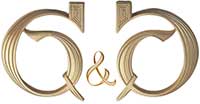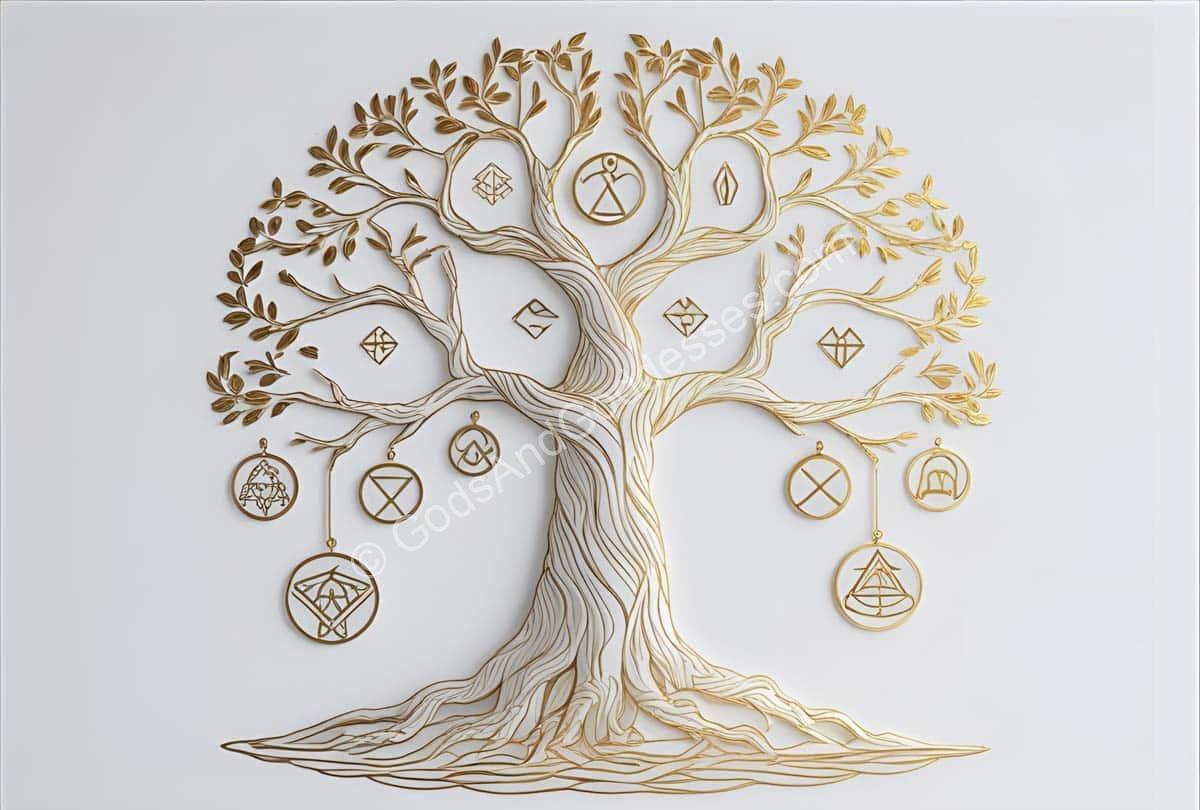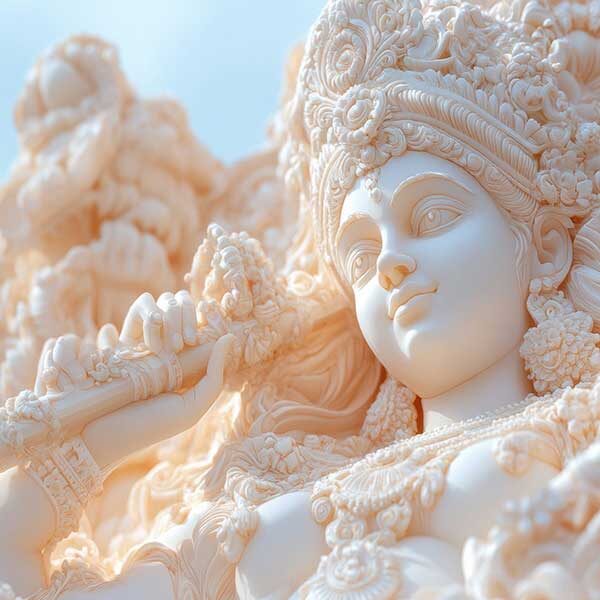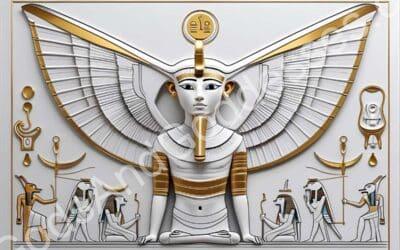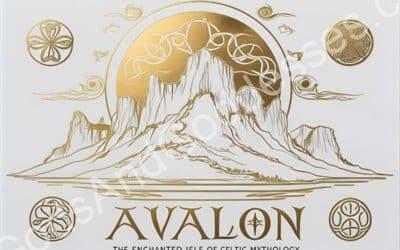Introduction: Why Yggdrasil Still Matters
In the heart of Norse cosmology stands Yggdrasil, the immense ash tree that connects the Nine Realms. Known as the World Tree, Yggdrasil is the cosmic axis, binding heaven, earth, and the underworld together. It is a symbol of interconnection, fate, and endurance, central to Norse myth and still a source of inspiration in modern spirituality and culture.
At GodsAndGoddesses.com, we explore mythological places, gods, and goddesses as part of humanity’s search for meaning. Yggdrasil stands as one of the most powerful symbols of connection, resilience, and destiny in world mythology.
“Yggdrasil holds the cosmos together—the bridge of life, death, and destiny in Norse myth.”
Key Takeaways About Yggdrasil
-
Yggdrasil is the World Tree in Norse mythology, connecting the Nine Realms.
-
Its roots reach into sacred wells guarded by beings of wisdom and chaos.
-
The Norns carve fate at its base, shaping the destiny of gods and mortals.
-
Yggdrasil is both strong and vulnerable, threatened by serpents and time.
-
It symbolizes interconnection, resilience, and the cycles of life, death, and renewal.
The Nature of Yggdrasil
The Poetic Edda and Prose Edda describe Yggdrasil as a vast ash tree whose branches stretch into the heavens and whose roots reach into the deepest realms.
-
The Nine Realms – From Asgard (home of the gods) to Hel (realm of the dead).
-
Cosmic Axis – Serves as the axis mundi, the central pillar of the cosmos.
-
Living Symbol – A tree that sustains and yet is vulnerable to decay.
See also: Mythological Places
The Roots and Branches of Yggdrasil
Yggdrasil’s three great roots link it to wells and realms:
-
Root in Asgard – At Urd’s Well, where the Norns weave destiny.
-
Root in Jotunheim – At Mimir’s Well, source of wisdom where Odin sacrificed his eye.
-
Root in Niflheim – At Hvergelmir, guarded by the serpent Nidhogg.
Its branches are equally expansive, sheltering gods, humans, and other beings beneath its vast canopy.
The Norns and Fate at Yggdrasil
At Urd’s Well, three Norns—Urd (Past), Verdandi (Present), and Skuld (Future)—tend Yggdrasil’s roots.
-
They water the roots with sacred clay and water.
-
They carve runes into its trunk, weaving fate itself.
-
Their work symbolizes the Norse view of destiny as inescapable, even for the gods.
See also: The Norns: Norse Goddesses of Fate
Yggdrasil in Mythological Stories
-
Odin’s Sacrifice – Hung on Yggdrasil for nine nights to gain the wisdom of the runes.
-
Ratatoskr – The squirrel who carried insults between an eagle above and Nidhogg below.
-
Animals of Yggdrasil – Serpents, stags, and eagles embodied the balance of life.
-
Ragnarök – At the world’s end, Yggdrasil will tremble, but it will endure, sheltering survivors.
Symbolism of Yggdrasil
-
Interconnection – All realms and beings are tied together.
-
Cycles of Life – Growth, decay, and renewal in its branches.
-
Wisdom and Sacrifice – Knowledge gained through suffering, as with Odin.
-
Endurance – A tree that withstands chaos yet requires constant tending.
“The World Tree teaches that every root, every leaf, is part of the same living whole.”
Yggdrasil Compared to Other Sacred Trees
World cultures share the archetype of a cosmic tree:
-
Tree of Life – Mesopotamian and Biblical traditions.
-
Bodhi Tree – Site of the Buddha’s enlightenment.
-
Ceiba Tree – Mayan connection between underworld, earth, and heavens.
Yggdrasil is the Norse expression of this universal image, marked by fate and struggle.
See also: Mythological Symbols
Yggdrasil in Modern Culture
-
Literature & Fantasy – Appears in Tolkien and Neil Gaiman’s works.
-
Games & Comics – Featured in God of War and Marvel’s Thor.
-
Neo-Paganism – Revered as a sacred image of fate and connection.
-
Tattoos & Art – Popular motif of resilience and cycles of life.
External resource: World History Encyclopedia – Yggdrasil
FAQs About Yggdrasil
What is Yggdrasil?
The World Tree in Norse mythology, connecting the Nine Realms.
What animals live in Yggdrasil?
An eagle at the top, Nidhogg the serpent below, Ratatoskr the squirrel, and several stags.
What happens to Yggdrasil at Ragnarök?
It trembles and suffers but endures, symbolizing resilience and rebirth.
Why did Odin hang on Yggdrasil?
To gain the wisdom of the runes, sacrificing himself to himself.
Conclusion
Yggdrasil, the World Tree of Norse mythology, is more than a mythological place—it is the very fabric of Norse cosmology. It binds the Nine Realms, embodies fate, and reflects the eternal cycle of growth, decay, and renewal. To contemplate Yggdrasil is to understand that life is both fragile and enduring, bound by fate yet always capable of renewal.
Explore more:
“Yggdrasil is the tree of life, death, and destiny—the axis around which the Norse cosmos turns.”
- Odin God Story - August 24, 2025
- The Story of Ra: Egyptian Sun God and Creator - August 24, 2025
- Kraken: Mythological Sea Monster of the Deep - August 24, 2025
